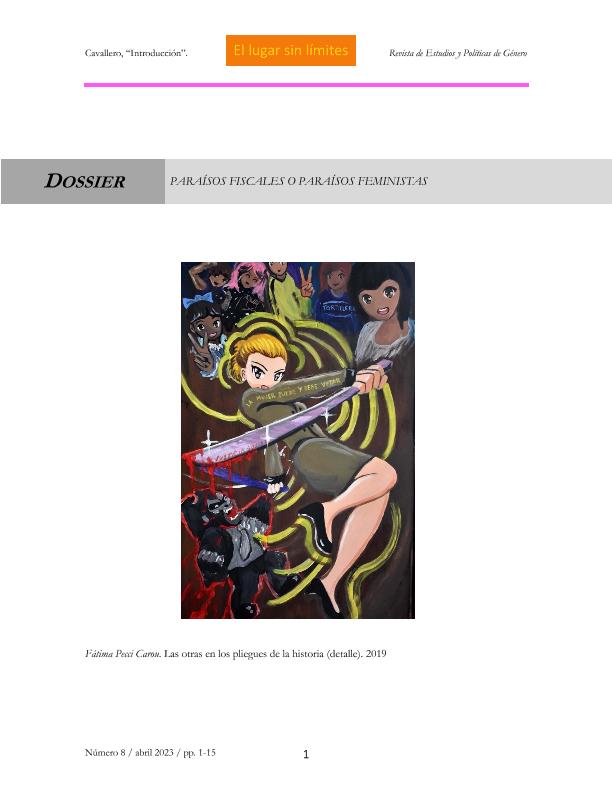Mostrar el registro sencillo del ítem
dc.contributor.author
Cavallero, Lucia Angela

dc.date.available
2023-12-06T17:04:28Z
dc.date.issued
2023-05
dc.identifier.citation
Cavallero, Lucia Angela; Paraísos fiscales o paraísos feministas; Universidad Nacional de Tres de Febrero. Instituto de Investigaciones en Arte y Cultura “Dr. Norberto Griffa”. Centro Interdisciplinario de Estudios y Políticas de Género; El lugar sin límites; 5; 8; 5-2023; 1-15
dc.identifier.issn
2683-9105
dc.identifier.uri
http://hdl.handle.net/11336/219542
dc.description.abstract
En los últimos años las movilizaciones feministas han empujado y promovido un cambio epistemológico en la forma de pensar los problemas económicos que aporta y tensiona con la ciencia económica, tanto en su versión ortodoxa como heterodoxa. Así, la llamada economía feminista, entendida como teoría y práctica política y no solo como campo de discusiónes teóricas-académicas, ha revitalizado el debate económico aportando temas, conceptos, herramientas y nuevos imaginarios para confrontar la hegemonía neoliberal. En buena medida esto inicia con una redefinición permanente, desde los así llamados “márgenes” del mundo del trabajo reconocido y registrado, de lo cuenta como trabajo y de quiénes producen riqueza. Esto, de modo consecutivo, permite abrir la pregunta sobre quiénes son las acreedoras de esa misma riqueza una vez que ha sido redefinida.
dc.description.abstract
In recent years, feminist mobilizations have pushed and promoted an epistemological change in the way of thinking about the economic problems that it brings and tension with economic science, both in its orthodox and heterodox versions. Thus, the so-called feminist economics, understood as political theory and practice and not only as a field of theoretical-academic discussions, has revitalized the economic debate by contributing themes, concepts, tools, and new imaginaries to confront neoliberal hegemony. To a large extent, this begins with a permanent redefinition, from the so-called "margins" of the world of recognized and registered work, of the account as work and of who produces wealth. This, in a consecutive way, allows opening the question about who are the creditors of that same wealth once it has been redefined.
dc.format
application/pdf
dc.language.iso
spa
dc.publisher
Universidad Nacional de Tres de Febrero. Instituto de Investigaciones en Arte y Cultura “Dr. Norberto Griffa”. Centro Interdisciplinario de Estudios y Políticas de Género
dc.rights
info:eu-repo/semantics/openAccess
dc.rights.uri
https://creativecommons.org/licenses/by-nc-sa/2.5/ar/
dc.subject
Economía feminista
dc.subject
Secreto fiscal
dc.subject
Deuda
dc.subject
Riqueza
dc.subject.classification
Tópicos Sociales

dc.subject.classification
Sociología

dc.subject.classification
CIENCIAS SOCIALES

dc.title
Paraísos fiscales o paraísos feministas
dc.title
Tax havens or feminist heaven
dc.type
info:eu-repo/semantics/article
dc.type
info:ar-repo/semantics/artículo
dc.type
info:eu-repo/semantics/publishedVersion
dc.date.updated
2023-12-05T15:06:32Z
dc.journal.volume
5
dc.journal.number
8
dc.journal.pagination
1-15
dc.journal.pais
Argentina

dc.journal.ciudad
Buenos Aires
dc.description.fil
Fil: Cavallero, Lucia Angela. Consejo Nacional de Investigaciones Científicas y Técnicas; Argentina. Universidad Nacional de Tres de Febrero; Argentina. Universidad de Buenos Aires; Argentina
dc.journal.title
El lugar sin límites
dc.relation.alternativeid
info:eu-repo/semantics/altIdentifier/url/https://revistas.untref.edu.ar/index.php/ellugar/article/view/1667
Archivos asociados
